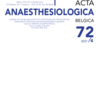Effect of walking to the operating room on preoperative anxiety in patients scheduled for outpatient laser therapy for venous insufficiency. A monocentric randomized study
preoperative anxiety; walking; ambulatory surgery; anxiety scale
Published online: Mar 29 2022
Abstract
Background: Preoperative anxiety in day surgery is associated with a higher incidence of post-operative complications such as postoperative nausea and vomiting, pain or unplanned admission.
Objectives: To evaluate the effect of walking to the operating room (OR) on anxiety in ambulatory patients undergoing minimal invasive laser therapy for venous insufficiency.
Design and setting: Randomized study in a tertiary hospital between May and November 2019.
Methods: 100 patients scheduled for ambulatory laser therapy for venous insufficiency were included. Patients were randomized to walk to the OR (study group, n=50) on even weeks or to lie in a bed to the OR (control group, n=50) on odd weeks.
Main outcome measures: Baseline anxiety was assessed using the Amsterdam Preoperative Anxiety and Information Scale (APAIS) and Numerical Rating Scale of anxiety (anxiety-NRS) from 0 to 10 when prepared for departure to OR. Preoperative anxiety-NRS assessment was performed upon arrival in the OR.
Results: Patients’ characteristics were similar in both groups. Baseline anxiety-NRS was significantly lower in the study group than in the control group: 2 (1-3) vs. 4 (2-6.5) (p=.013) respectively. No difference was observed between the groups for preoperative anxiety-NRS. A significant reduction in anxiety-NRS on arrival at the OR was observed in the control group compared with the study group (p=.019).
Conclusion: Walking to the OR does not reduce anxiety in ambulatory patients undergoing minimal invasive laser therapy for venous insufficiency. But, preparing them to walk to the OR could possibly reduce baseline anxiety while waiting for surgery.
